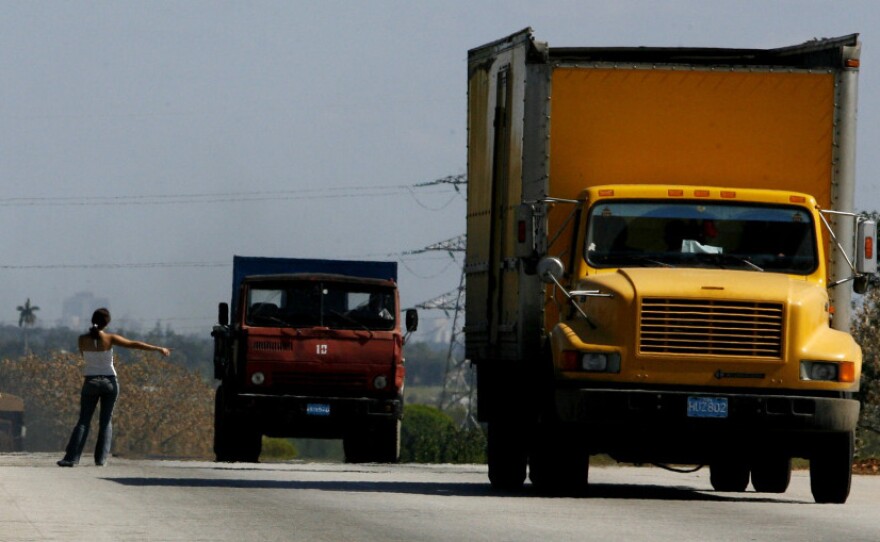Cuba's capital, Havana, has good public safety and terrible public transportation. That has led to a curious form of travel, especially for young women in the city: urban hitchhiking.
At major intersections, women climb in and out of strangers' cars, commuting to work or running errands in a way that would be almost unthinkable in any other Latin American capital.
There aren't enough cars in Havana for Friday-afternoon rush hour to create traffic jams. But it is a peak time for hitchhiking. At a stoplight along the oceanfront Malecon Boulevard, there are two dozen or so young women trying to coger botella as it's called in Cuban parlance. It literally means "grabbing a bottle," after the universal thumbs-up hitchhiking sign. Only no one here uses thumbs anymore. Instead, when cars pull up, smiling women lean in to ask drivers for rides. Some practically force their way into cars, even to travel just a few blocks up the street.
Chaotic Public Transportation
Art teacher Karenia Cintra hitchhikes to and from work every day.
"It's so much easier than waiting for the bus, or paying for a taxi," she said. "Sometimes you meet really nice people. There's nothing weird or risky about it."
Many Americans used to travel this way, and still do in places with informal car pools like Washington, D.C., or San Francisco. Most Latin American cities are too dangerous for getting around this way. But in Communist-run Cuba, there's little violent crime, a lot of cops and a kind of neighborly solidarity born of hard times. It also helps for young Cuban women asking for rides that the majority of drivers are men.
What Cuba doesn't have, of course, is a functional public transportation system.
For years, Havana's streets were clogged by widely despised "camel" buses, huge modified cargo containers with a sunken midsection dragged along by a semi truck. They have been replaced by a new fleet of articulated buses from China. But they aren't any more comfortable than the camels when they're packed to the gills and roasting in the tropical heat.
Sometimes, they're so stuffed that the doors can't close and passengers are riding down the street hanging off the sides. For Cubans who don't have a car or bike and can't walk to their destination, the only other options are a costly taxi or to "grab a bottle."
Hitchhiking A Dependable Option
Gisel Marquez said she'd rather try her luck asking for rides under the hot sun than suffocate on a sweaty bus.
"There's no other choice," she said. "There's no public transportation that runs often enough or you can depend on."
Elsa Gonzalez is another hitchhiking urban commuter, riding around each day with total strangers. She says it's always best to look for single male drivers, preferably in state-owned vehicles, like delivery vans or work trucks. They're supposed to carry passengers if they have the space.
"Female drivers don't give rides as often," Gonzalez explained in Spanish. "If it's a couple, you also have to be careful, because you don't want to make anyone jealous."
"When it's two men," she said, "that's even better."
Gonzalez said she recently went to visit her brother in Miami but didn't dare travel around this way. Everyone's in such a hurry, she said, and there are so many cars driving so fast, even if most of them only have one person.
Copyright 2022 NPR. To see more, visit https://www.npr.org. 9(MDAzMjM2NDYzMDEyMzc1Njk5NjAxNzY3OQ001))






